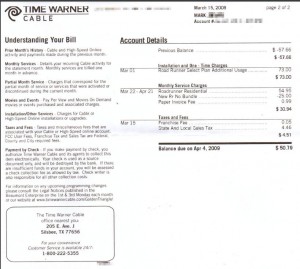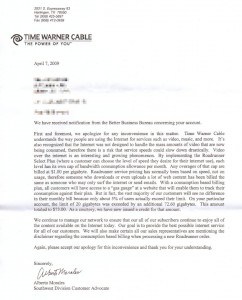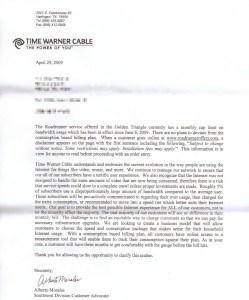
Beaumont & Golden Triangle, Texas residents were the first to face Time Warner Cable Internet Overcharging experiments.
For awhile there, it seemed like nobody in the Golden Triangle on the Gulf Coast of Texas was paying attention to the fact their region was the nation’s guinea pig for Internet Overcharging schemes. How wrong we were.
Stop the Cap! reader Mark, who lives just north of Beaumont in the city of Silsbee, had been fighting a one man battle against not one, but two providers serving his community of 7,400 — Time Warner Cable and AT&T. Mark may exemplify the average consumer in the Golden Triangle, unaware that their broadband service had been subjected to Internet Overcharging experiments until the bill arrived in the mail. Both providers have a track record of not always disclosing such schemes to their customers when trying to sign them up for service in southeastern Texas.
Both providers have used the area for pricing experiments, providing paltry usage allowances and charging steep overlimit fees for exceeding them.
Mark’s problems began when he unknowingly set himself up to be overcharged later. Originally a Time Warner Cable customer, Mark decided to give AT&T’s Elite DSL package a try, primarily because it was less expensive than Road Runner service and supposedly faster as well. AT&T claims their Elite DSL service in Silsbee provides up to 6Mbps down/768kbps up speed for $35 a month, compared with Time Warner Cable’s Golden Triangle Road Runner, providing (at the time) 5Mbps down/384kbps up speed for $44.95 a month.
“After DSL was installed, we discovered we were too far from the [phone company facilities] to get Elite speed, and instead of informing us about the problem, they switched us to Basic service speed, which is up to 768kbps down/384kbps up, and never bothered to tell us,” Mark writes.

The bill Stop the Cap! reader Mark received showing $73 in Internet Overcharging penalties (click to enlarge)
After Mark’s family felt AT&T was too slow to meet their needs, they ventured back to Time Warner Cable for Road Runner service. The salesperson offered a “welcome back” discount, and mentioned nothing about the fact Time Warner Cable had implemented an Internet Overcharging scheme on the residents of the Golden Triangle region. Instead of his old service priced at $44.95 a month for unlimited use, his new standard service was priced at $54.95 a month, and was limited to 20GB of usage per month before a $1/GB overlimit penalty kicked in.
When the first bill arrived showing his family exceeded that amount, it was quite a shock. In addition to the $54.95 charge for “Roadrunner Residential”, there was a $73.00 fee entitled, “Road Runner Select Plan Additional Usage.” (They also nickle and dimed him $0.99 for a “Paper Invoice Fee.”)
This was the first time Mark had encountered an “additional usage” overlimit fee, so he called Time Warner Cable to investigate. Despite what the salesperson had sold him on, and online promotions were still selling to attract new customers, Mark learned for the first time Time Warner Cable changed pricing. The Golden Triangle Division of Time Warner Cable implemented an Internet Overcharging scheme in June 2008, but only applied it to new customers. Had Mark never left Time Warner Cable for AT&T, he would have never been an unwilling participant in the experiment to extract an extra $73 from his wallet.
Because he returned to Time Warner Cable after the “experiment” commenced, he was stuck.
Mark was angry. He contacted the Better Business Bureau (BBB), the Federal Trade Commission, and the Federal Communications Commission to complain about unfair business practices, improper disclosure of the Internet Overcharging scheme, and abusive pricing.

Time Warner Cable's 4/7/09 letter in response to a Better Business Bureau complaint regarding Internet Overcharging schemes implemented in the Golden Triangle, Texas (click to enlarge)
The most productive response came from Time Warner Cable, responding to the BBB complaint Mark had filed. In addition to giving the standard talking points about Internet Overcharging schemes, Alberto Morales, Southwest Division Customer Advocate for Time Warner Cable, suggested the company would do a better job of training salespeople to disclose “the disclaimer regarding the consumption based billing when processing a new Roadrunner order.” Morales also issued a one time credit for the $73 in overlimit fees charged to Mark’s account.
Mark recognized the language of the letter for what it was — propaganda from a cable broadband provider looking to cash in at the expense of their customers. Among the dubious reasons given in the letter:
It’s also recognized that the Internet was not designed to handle the mass amounts of video that are now being consumed, therefore there is a risk that service speeds could slow down dramatically. Video over the internet is an interesting and growing phenomenon.
So are Internet Overcharging schemes, but few would call them “interesting.” Using the company’s own logic, Time Warner Cable should not be placing video on their own customer website, much less embark on a grand experiment called TV Everywhere to stream enormous amounts of video at broadband speeds to their customers. Now that is interesting. The “Internet brownout” theory of slowdowns and outages can occur when a provider chooses to pocket profits instead of keeping up with required investments to maintain their broadband network. Time Warner Cable CEO Glenn Britt disputes there is a problem with Time Warner Cable’s network as-is, telling a conference sponsored by Sanford Bernstein in May that, “I’m very comfortable with our plant… I don’t see a need for a massive upgrade.”
By implementing the Roadrunner Select Plan (where a customer can choose the level of speed they desire for their internet use), each level has its own cap of bandwidth consumption allowance per month.
Of course, customers cannot choose the one plan that has been an outstanding success for Time Warner Cable since its inception – the one they have right now (or had in the Golden Triangle prior to the “experiment”), unless they were willing to pony up 300% more for the same level of service, based on the last proposal Time Warner Cable introduced before temporarily “shelving the plan” due to customer outrage.
In the Golden Triangle, the maximum amount of usage was 40GB per month, followed by “the sky is the limit” $1/GB overlimit penalties.
Morales claimed that only “5% of users actually exceed their limit.” But 100% of the Golden Triangle’s customers were left waiting for the arrival of a “gas gauge” measuring their usage, something they would now be required to check daily if they wanted to be sure not to exceed the paltry level of “bandwidth allowance” they were granted.

Time Warner Cable's follow-up letter of 4/29/09, in response to Mark's complaints that he was never told about the Internet Overcharging plan which subjected him to a 20GB monthly limit and $73 in overlimit penalties. (We assume the June 6, 2009 reference is a typo and should have read 2008) (click to enlarge)
Mark wasn’t sold by any of the arguments Morales was making. That’s because he read Time Warner Cable’s own shareholder documents, as he had been accustomed to doing since he bought shares himself. They told a very different story — one he shared in a letter to Morales:
“In 2007, Time Warner made $3,730 million dollars on high speed data alone, and then had to turn around and spend $164 million to support the cost of the network,” Mark writes. “In 2007, total profit on high speed data was $3.566 BILLION dollars.”
He adds, “in 2008, Time Warner made $4,159 million dollars on high speed data alone, and then spent just $146 million to support the cost of the network, a decline from the year past. Total profit in 2008 on high speed data: $4.013 BILLION dollars.”
Mark realized “it cost Time Warner 11% less money to keep their network running in 2008 than in 2007.”
He also knew Time Warner Cable’s experiment in his city was done where the only alternative was his AT&T DSL service, which hardly offered comparable competition.
In a follow-up letter responding to Mark in late April (after the four city experiment was shelved), Time Warner Cable made it very clear their position was firmly planted in the ground:
“There are no plans to deviate from the consumption based billing plan.”
The company also elected to blame the customer for not understanding that an Internet Overcharging scheme had been introduced in the first place.
“When a customer goes online at www.roadrunneroffers.com, a disclaimer appears on the page with the first sentence including the following, “Subject to change without notice. Some restrictions may apply. Installation fees may apply.” This information is in view for anyone to read before proceeding with an order entry.
The fact this kind of disclaimer is, in the company’s view, sufficient notice for implementing Internet Overcharging schemes, is hardly adequate.
“We eventually dropped them again,” Mark writes. “We thought a usable slower Internet was better than a faster one we were not going to use.”
Mark realized Time Warner Cable’s business practices and models aren’t a good fit for the way he feels companies should treat their customers, and he dumped his Time Warner Cable stock and did what so many customers have also chosen to do: use the one word Time Warner Cable did seem to understand during their Internet Overcharging experiment: C A N C E L.
As long as broadband providers continue to believe that Internet Overcharging schemes are the best way to protect their business models and leverage even more profits from their broadband division, action on every front, from legislative to direct consumer protest and refusal to do business with such companies remain the best course of action.
Stop the Cap! will continue to help deliver that action, along with a consumer education campaign that doesn’t require focus group testing to sell, because it’s based on common sense and not dollars.
Still to Come: Mark takes his battle to AT&T and gets an upper level AT&T retention agent to mark his account “exempt” from Internet Overcharging fees and penalties. Perhaps you can, too!


 Subscribe
Subscribe






